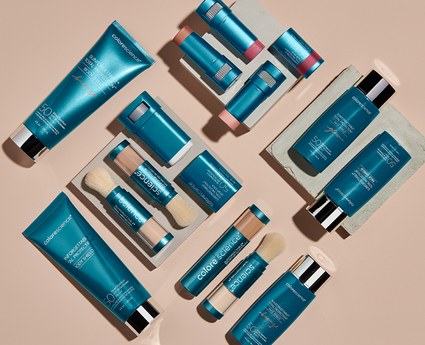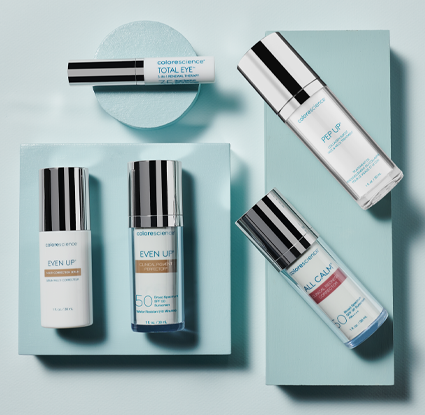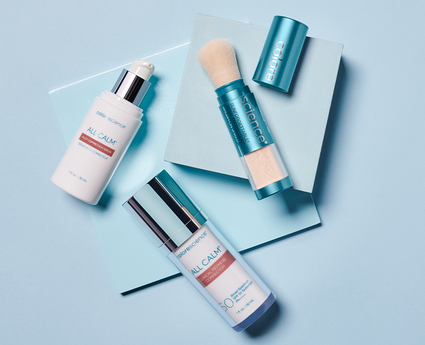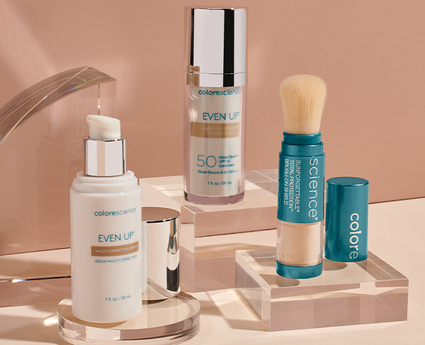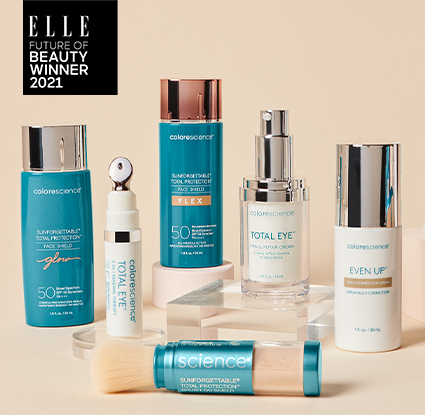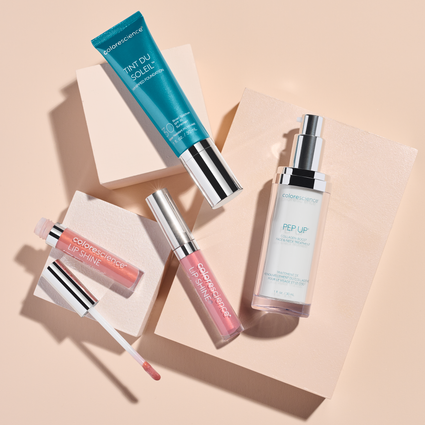Does Sunscreen Prevent Wrinkles?
While it’s common knowledge that sunscreen protects your skin against sunburns and minimizes your risk for skin cancer, you might also be wondering, “does sunscreen prevent wrinkles?”
In the most basic terms, yes. In addition to preventing sunburn and other sun damage, sunscreen can also help your skin stay looking young and healthy—and that includes playing an important role in keeping your skin wrinkle-free. So, if you’ve been searching for ways to hinder the appearance of fine lines and wrinkles on your skin, sunscreen may be the solution.
In this guide, we’ll answer the question, “does sunscreen prevent wrinkles?”, discuss how the sun can speed up facial aging, and explain how sunscreen can play a role in protecting your skin. Keep reading to learn everything you need to know about sunscreen and wrinkles or use the links below to navigate the post.
- Does Wearing Sunscreen Prevent Wrinkles?
- How Sun Rays Damage Skin
- How to Choose the Right Sunscreen to Prevent Wrinkles
- Why It’s Essential to Wear Sunscreen Every Day
- When to See a Doctor for Wrinkles
- Keep Your Skin Looking Youthful
Does Wearing Sunscreen Prevent Wrinkles?
According to Yale Medicine, one way to prevent wrinkles and other symptoms of photoaging—when your skin prematurely ages due to increased sun exposure—is to wear a broad-spectrum sunscreen that has a sun protection factor (SPF) of 30 or higher. Not only can photoaging cause wrinkles, but it can also increase the creation of sunspots, reduce the elasticity of your skin, and break capillaries around the nose and chest.
Both mineral and chemical sunscreens can prevent symptoms of photoaging from forming and taking a toll on your skin through their sun-blocking techniques. Mineral sunscreens will reflect harsh ultraviolet (UV) rays and chemical sunscreens will absorb these rays and transform them to heat through a chemical reaction. We’ll go over the two types of sunscreens later on.

How to Minimize Wrinkles with Sunscreen
Now that you know the answer to the question “does sunscreen prevent wrinkles?”, you can start working toward healthier and more youthful skin with sunscreen. Skin can begin aging as early as your late 20s, so it’s best to do this while you’re still young. Applying sunscreen daily is the first step to minimizing the formation of wrinkles. The second step is to apply it correctly.
To help you take full advantage of the benefits of sunscreen, here are a few tips for sunscreen application:
- You should reapply sunscreen every two hours or every 40 to 80 minutes you come into contact with water or sweat.
- If using a chemical sunscreen, wait 30 minutes or more before going outside. You don’t have to wait if you’re applying mineral sunscreen.
- Use enough sunscreen to cover the exposed parts of your body. Most adults will need a nickel-sized amount for their face.
- Don’t forget to apply sunscreen to your neck, ears, leg, the top part of your feet, and even the area around your eyelids. Since the eyelids are particularly sensitive, it’s best to use a natural physical sunscreen because it contains gentle ingredients.
How Sun Rays Damage Skin
To gain a deeper understanding of how the sun can damage your skin, you must first know the different types of UV radiation that are emitted from the sun:
- UVA rays are what cause photoaging, which can lead to wrinkles, sun spots, and redness around the face.
- UVB rays are the main culprit behind sunburns and skin cancers.
UVA rays will penetrate your skin more deeply than UVB rays, reaching and damaging essential fibers, such as collagen and elastin, that are responsible for keeping your skin smooth, healthy, and young. As a result, your body may attempt to produce more elastin, which will trigger the production of metalloproteinases enzymes as well.
In an attempt to restore and rebuild the damaged collagen fibers, these enzymes may degrade the collagen, leading to skin that’s incorrectly repaired. The more this process happens, your chance of developing wrinkles and related photoaging symptoms increases.
According to the Skin Cancer Foundation, photoaging is responsible for 90% of visible changes to the skin, so it’s vital to take care of it with sunscreen.

How to Choose the Right Sunscreen to Prevent Wrinkles
So, does sunscreen reduce wrinkles? The answer is yes. However, whether your sunscreen minimizes signs of aging or not will greatly depend on the type of sunscreen you’re wearing since not all sunblocks* protect against UV-A rays, the UVs responsible for aging skin.
That said, it’s best to choose a broad-spectrum sunscreen that’s 30 SPF or higher that not only prevents sunburns but is also better for the overall longevity of your skin. Does SPF prevent wrinkles? Not exactly, but it’s an essential component of a good, protective sunscreen.
Some sunscreens will also include a PA+ rating on their packaging. PA+ ratings work in a similar way as SPF but will measure how well the sunscreen shields against UVA rays. If you’re looking for the best sunscreen to use, ensure it has three plus signs or more for maximum protection against the sun.
In addition to choosing a broad-spectrum sunscreen, you’ll also have to look beyond the SPF rating and read the label of the product. This is because mineral and chemical sunscreens are not created equal, plus the latter could have ingredients that are harmful to your body. Here are a few key differences:
- Chemical sunscreens, which are the most common type of sunscreen, contain several ingredients that may harm your overall health since they are absorbed into the skin to prevent sun damage. This includes ingredients, such as oxybenzone, avobenzone, and octinoxate—just to name a few. While the use of these ingredients is approved by the Federal Drug Administration (FDA), the organization is evaluating the effectiveness and safety of 12 ingredients found in chemical sunscreens.
- Mineral sunscreens, or physical sunscreens, contain only two main ingredients—zinc oxide and titanium dioxide—that have been deemed safe and effective by the FDA. This type of sunscreen works by acting as a mirror that reflects UV rays instead of absorbing them.
To recap, when choosing a sunscreen that can help minimize and prevent wrinkles you should look for broad-spectrum, an SPF of 30 higher, a PA+++ rating, and non-toxic ingredients. The sunscreen you use should also be water-resistant if you’re planning on swimming, sweating, or participating in activities where you may get wet.

Other Products That Can Pair with Your Sunscreen to Prevent Wrinkles
While aging can be frustrating, it’s also quite natural for your skin to produce a few wrinkles over time despite your best efforts. That said, there are many steps you can take to slow down this process and ensure your skin looks good for as long as possible. This can be done by pairing your sunscreen with other anti-aging skincare products, such as the Pep Up® Collagen Boost Face and Neck Treatment and Total Eye® 3-in-1 Renewal Therapy with SPF 35 from Colorescience.
Both products are clinically proven to repair and defend your skin against visible signs of aging, from crow’s feet to sagging skin. In fact, 95% of users noticed an immediate difference in their skin’s health with Total Eye®.
Why It’s Essential to Wear Sunscreen Every Day
You might be wondering “is that necessary?” or “does wearing sunscreen every day prevent wrinkles?”, and the answer to both those questions is yes. While wearing sunscreen every day can prevent wrinkles, it can also reduce your risk of skin cancer. According to the Skin Cancer Foundation, daily sunscreen use can lower your chances of developing squamous cell carcinoma by approximately 40% and melanoma by 50%.
In the United States alone, more than two people die every hour due to skin cancer, which is why it’s crucial to practice sun safety daily. Besides wearing sunscreen, there are several things you can do to shield your skin from the damaging effects of the sun, such as:
- Staying out of the sun during peak hours ( 10 a.m. to 4 p.m.)
- Wearing sun-protective clothing (i.e., long-sleeve shirts and pants)
- Wearing wide-brim hats and glasses to protect your scalp and eyes
- Using sunscreen even if it’s cloudy outside and during the winter months
- Finding shade whenever possible

When to See a Doctor for Wrinkles
Wrinkles are often not a cause for concern, especially since many occur naturally and become more apparent with age. However, they can be discouraging to look at when caused prematurely due to photoaging. If you’re worried about the toll the sun has taken on your skin, speaking with a certified dermatologist can help. A dermatologist will assess your skin and may treat wrinkles with the following:
- Laser resurfacing: Also known as fractional resurfacing, laser resurfacing uses a laser beam to remove the uppermost layer of your skin and encourage the production of collagen.
- Topical creams: You can receive a prescription for topical retinoids to reduce the appearance of fine lines and wrinkles on your skin.
- Chemical peels: This treatment option involves a dermatologist applying a chemical solution to your face, allowing them to remove the top layer of skin. As a result, the skin can grow back smoother and healthier.
While there are several treatment options for wrinkles, keep in mind that the effects of photoaging can’t always be reversed completely. Seeking assistance from a dermatologist may only minimize their appearance. That said, it’s always important to speak with a dermatologist if you develop a new mole on your skin or experience other symptoms of skin cancer.
Keep Your Skin Looking Youthful
Keeping your skin looking youthful doesn't have to be hard work. With the right sunscreen and skincare products, your skin can maintain a vibrant and healthy appearance for a long time. Remember, SPF doesn’t prevent wrinkles, so look for a broad-spectrum screen that you can wear daily.
At Colorescience, we carry a wide selection of mineral sunscreens that are made with high-quality ingredients and offer protection against UVA/UVB rays, pollution exposure, blue light, and infrared radiation. From primers to our Total Protection™ Face Shield collection, finding the right non-toxic sunscreen for your lifestyle will be a breeze with Colorescience.
*Sunblock is not a term approved by the FDA. Colorescience refers to our products as sun protection.

